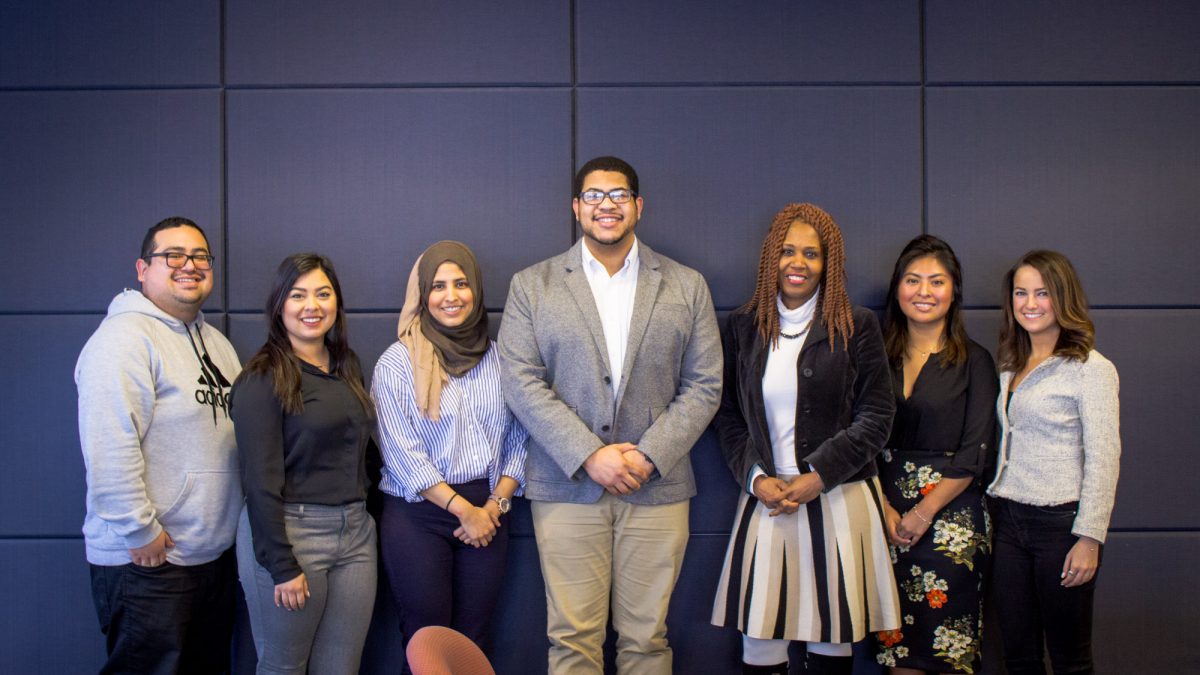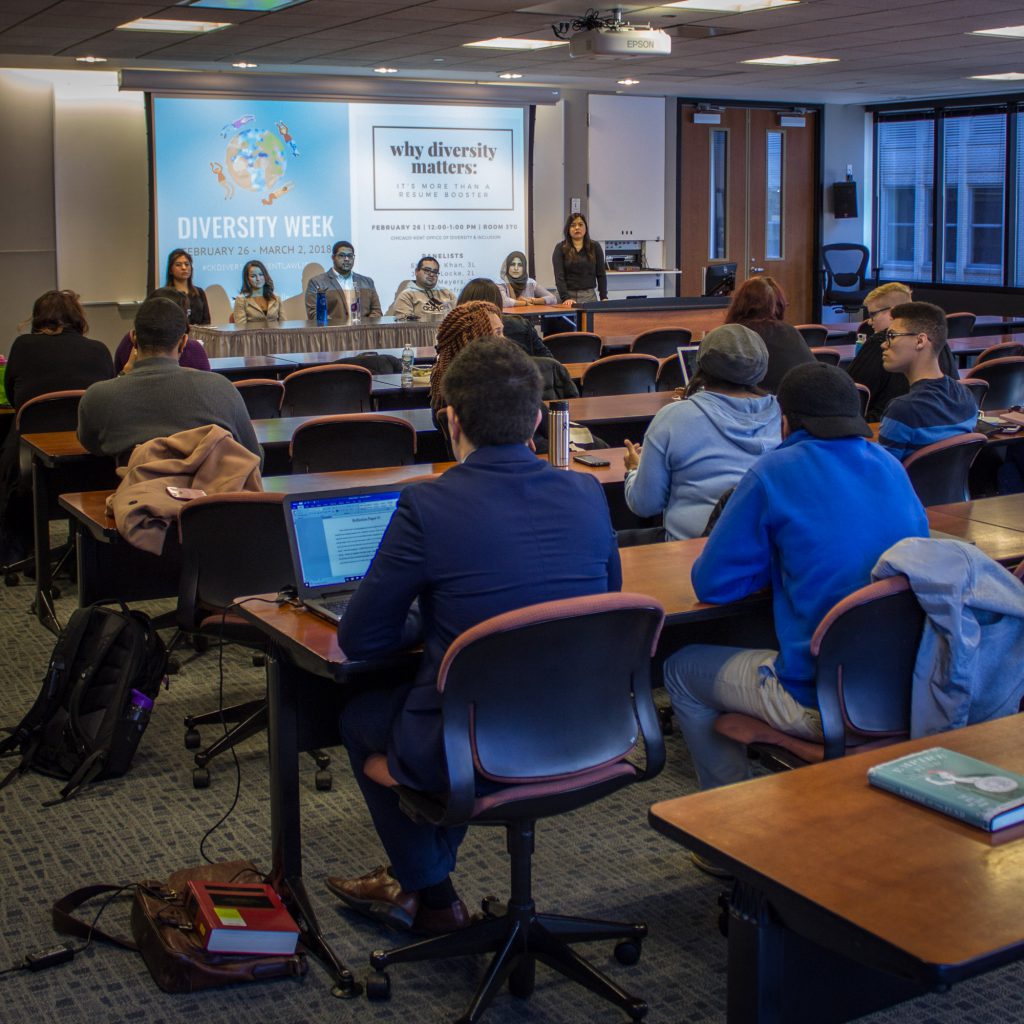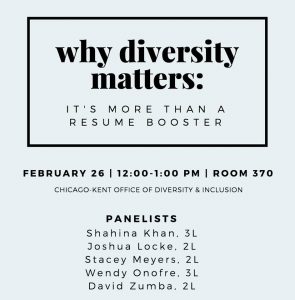 Diversity Week 2018 started off with a panel about what diversity means to law students and issues affecting minorities in the legal field.
Diversity Week 2018 started off with a panel about what diversity means to law students and issues affecting minorities in the legal field.
Moderator Joanna Martin started the panel with prepared questions, then opened it up for a Q&A with the students in the audience. Our speakers shared their experiences in classrooms and courtrooms to show the value of including more diverse perspectives in the legal field.
While the student leaders agreed on many principles, they also offered contrasting perspectives about presenting their experiences in conversations or written statements like scholarship applications.
Panelists:
- Shahina Khan, President of Criminal Law Society and Muslim Law Students Association
- David Zumba, VP of HLLSA and VP of Criminal Law Society
- Joshua Locke, of the SBA ABA and finance committees, managing social media for BLSA
- Stacey Meyers, President of Decalogue, WIL 2L Class Representative
- Wendy Onofre
What does Diversity mean?
Joanna Martin opened the session with this question: What does diversity mean to you in the context of law school and the legal profession? Why is it important?
The students emphasized the need to welcome different perspectives in the classroom as a key value for law school and for students to have confidence in the value of their opinions for all law students.
Stacey Meyers said the range of cultural and religious backgrounds at Chicago-Kent wasn’t available in her hometown and the diversity here has been a valuable part of her experience.
For women in the law school, Wendy Onofre said she was sorry to see men monopolize classroom discussion when women were often at the top of her class. She thought it reflected a need to push through concerns about not always being right to represent a different view.
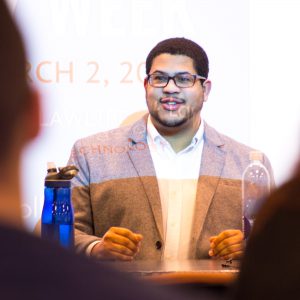 Joshua Locke described reading cases about racial discrimination in class and seeing how black students don’t feel so far removed from them because they grew up hearing the stories from people who actually went through the situations, whereas other students felt more removed because they weren’t familiar with them.
Joshua Locke described reading cases about racial discrimination in class and seeing how black students don’t feel so far removed from them because they grew up hearing the stories from people who actually went through the situations, whereas other students felt more removed because they weren’t familiar with them.
“More students need to see how the law can impact different groups of people, so having students in class who know firsthand can be very valuable in law school” – Joshua Locke.
David Zumba agreed, saying it’s key to see the value of your viewpoint to classroom discussions when you aren’t part of the majority.
Shahina Khan brought up experiences she’s had in Chicago courtrooms working with her 711 license, saying she doesn’t enjoy being seen as a default ambassador for her group, that would be nice to just feel welcome as a person without always having to answer the same questions.
Is Diversity “Done”?
As the term diversity is more common in the legal profession, Joanna Martin said many people think “oh our work is done” or have an attitude that diverse people now have the unfair advantage when applying for jobs because of diversity programs.
Her next question for the panelists was: How do you respond to people who think of diversity as just a resume booster? More to the point, how do you respond when people ask if you got a job because of your diversity?
Several students expressed frustration with those types of questions and assumptions. They pointed to the proportion of talented applicants for just a few diversity scholarships and those questions prove lack of awareness of advantages people receive who don’t need these programs.
The speakers agreed it’s always better to ask questions to get to know someone’s specific experiences and expertise than to start out assuming you know their story. Stacey Meyers said many people would assume she hasn’t faced discrimination since she looks like a white girl, but her family has experienced very specific anti-Semitic threats throughout her life. Like the other speakers, she said we need to have more conversations to really understand how people see the world.
Wendy Onofre said she wished more people saw the role of resources in the challenges people still face:
“When someone doesn’t see how deeply unfair the whole system has been, it’s very frustrating to be targeted by them for a few separate opportunities.” – Wendy Onofre
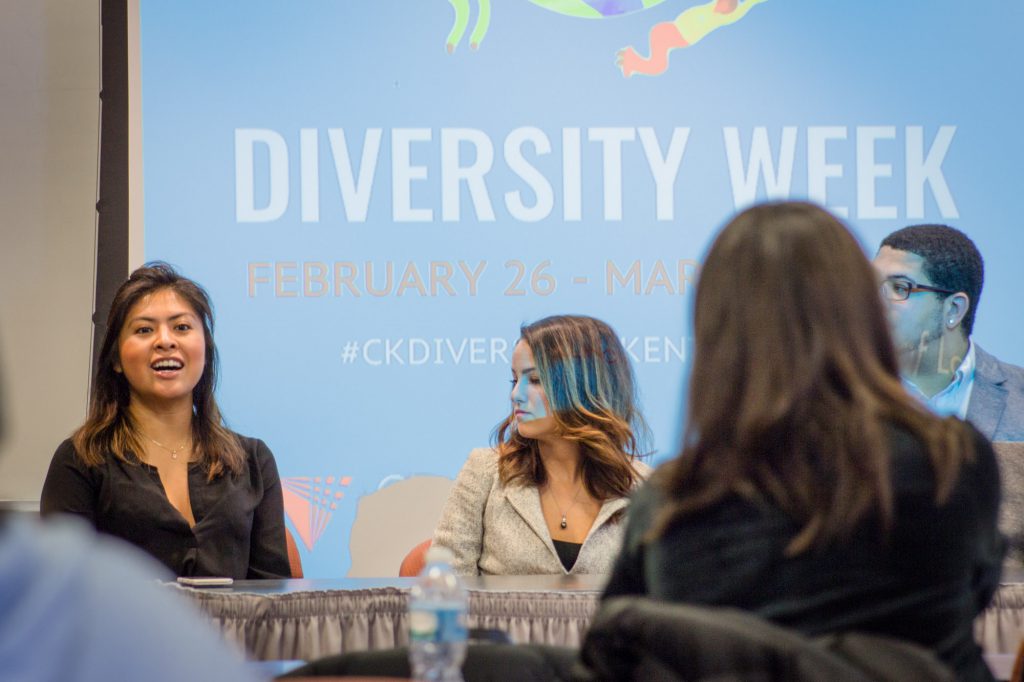 Conversations about Diversity
Conversations about Diversity
Joanna Martin noted that it’s a profession wide, country wide issue, that the people who need to learn more about diversity are not the ones who attend these conversations. Her next question for the speakers: How do you inform people who are not availing themselves of these conversations?
The student speakers took different approaches on how they respond if the questions come to them personally, often depending on the way the questions are asked. Stacey said she welcomes the chance to address and change misconceptions so she can help people gain better understanding.
Joshua Locke said sometimes he brings up topics about race in casual conversations with people to make sure that these conversations are happening. Like, “Did you see the H&M ad?,” “What did you think about it?,” “Here’s what I thought about it,” “I have this opinion because I’m looking at it in a certain context.”
He wants to give people who don’t have the same context, or look at life through a certain lens, an opportunity to speak to gauge whether they’re thinking about these issues and create an opportunity to share his perspective. He said for him it’s all about being intentional, blunt without being crass.
David Zumba said if you don’t feel comfortable addressing a touchy topic in class, he would encourage students to follow up later one on one when someone brings a perspective that you disagree with:
“You don’t need to feel obligated to be a spokesperson but if you have something to say, sharing your views can break down ignorance.” – David Zumba
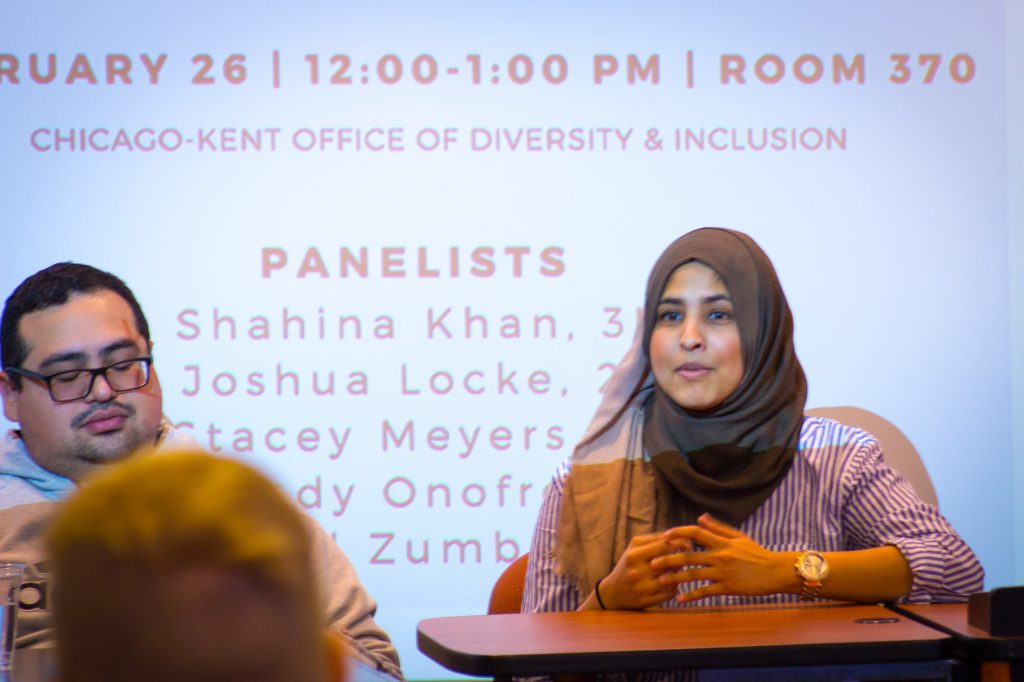 Shahina contrasted the other panelist’s responses, saying she doesn’t want to answer invasive questions that are personal and rude just to satisfy someone’s curiosity. Some examples she’s gotten too often include “Is someone forcing you to cover your hair? Does your dad see your hair? Do you shower with your hair covered?”
Shahina contrasted the other panelist’s responses, saying she doesn’t want to answer invasive questions that are personal and rude just to satisfy someone’s curiosity. Some examples she’s gotten too often include “Is someone forcing you to cover your hair? Does your dad see your hair? Do you shower with your hair covered?”
On the other hand, genuine questions about her beliefs can be worded respectfully – “Why do you choose to wear a cover?” comes off very differently and can open up a conversation. If you want to understand a broad general issue, Shahina emphasized going to Google first instead of asking someone to answer questions on behalf of everyone from their culture or religion.
Audience Q&A
How do you answer the “diversity statement” question on applications?
Shahina and David talked about specific experiences that have shaped them, from Shahina’s experience as an immigrant to David’s goals to use his skills in the future to benefit the community he grew up in.
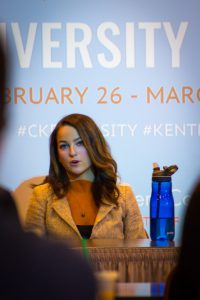 When it came to discussing experiences with discrimination or other challenges, some students disagreed. Joshua Locke said he’s ok with using rough things that have happened to me to my favor. Bad things that have happened can change your perspective and they give you something new to offer.
When it came to discussing experiences with discrimination or other challenges, some students disagreed. Joshua Locke said he’s ok with using rough things that have happened to me to my favor. Bad things that have happened can change your perspective and they give you something new to offer.
“Our good and bad experiences shape who we are. Show how your unique experiences have affected you in what you have overcome.” – Stacey Meyers
On the other hand, Wendy Onofre said she doesn’t like to take a “pity story” approach because she doesn’t want that kind of detail to be the anecdote someone remembers about her. She described facing a family health crisis that affected her grades as an example, saying she may explain the impact if necessary but she wouldn’t use that story as the basis for a written statement.
Wendy’s favorite example of incorporating a different perspective was writing an essay on being a CTA expert. The essay let her show the skills she’s developed and what her daily experience has been without explicitly mentioning anything about where she lives or drawing the diversity side into it.
Students in the audience chimed in on this question, offering other valuable examples. One student described growing up black in a majority white context, saying her only experience as a “diverse candidate” was her mother making sure she gained more knowledge about her culture and heritage by guiding her to authors and resources that weren’t always included in her curriculum.
Another student said her experience was the opposite – growing up in a majority Hispanic context, she didn’t experience discrimination, but it did give her a deeper awareness of the diversity of different cultural backgrounds among Hispanic people. She described recognizing the differences between accents from Peru to Puerto Rico and understanding what those backgrounds mean to people as something unique to her background.
What is the goal of the “diversity statement” questions?
The student panelists agreed this can be a challenging questions to answer from their side of the applications, but agreed they needed to demonstrate the skills they’re bringing to the table.
Joshua Locke said these sorts of assignments require you to take a step back and do some self reflection to figure out how your experiences have given you certain abilities that other people don’t have. Stacey Meyers said if you’re going to bring up negative experiences, always emphasize what you’ve brought away from them.
Wendy Onofro noted that you don’t always have to be explicit about your background to demonstrate what you’ve learned – stories can demonstrate your skills and allude to your context without making that the focus.
Staff Responses
Michelle Mohr Vodenik from the Career Services Office said she’s helped students write many diversity statements. Her first advice is that authenticity matters most. She said that may take different forms and look different for each person, but if you should be honest about what you bring to find a place that responds well to who you are.
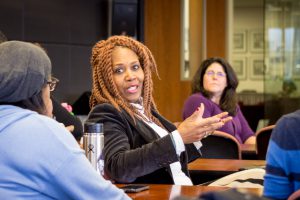 Professor Marsha Ross Jackson agreed, saying the goal should always be to demonstrate that you are the right fit.
Professor Marsha Ross Jackson agreed, saying the goal should always be to demonstrate that you are the right fit.
Adversity may be a big part of work in a law firm, so show how you have overcome challenges to build the skills you will need to be successful at the firm. Think about the goals of the program carefully to make sure your personal experiences have prepared you to be successful through the program.
If your grades or test scores are not strong, a diversity statement is your opportunity to explain both unfortunate circumstances that interfered with your ability to perform at a certain level, as well as to highlight other desired characteristics and strengths that you bring.
It should never be a “pity party.” Rather, the goal is to highlight the diverse experiences that made you who you are today, motivated you to pursue a certain path, or provided you with a unique perspective that adds value.

